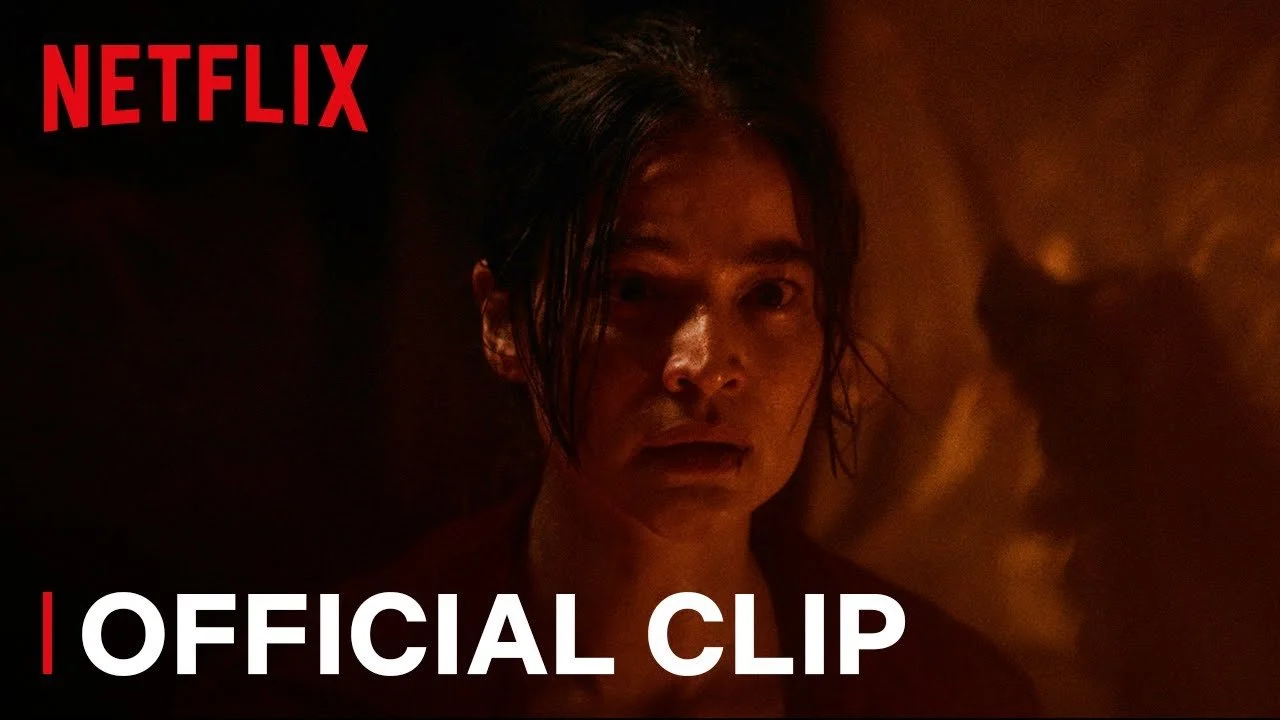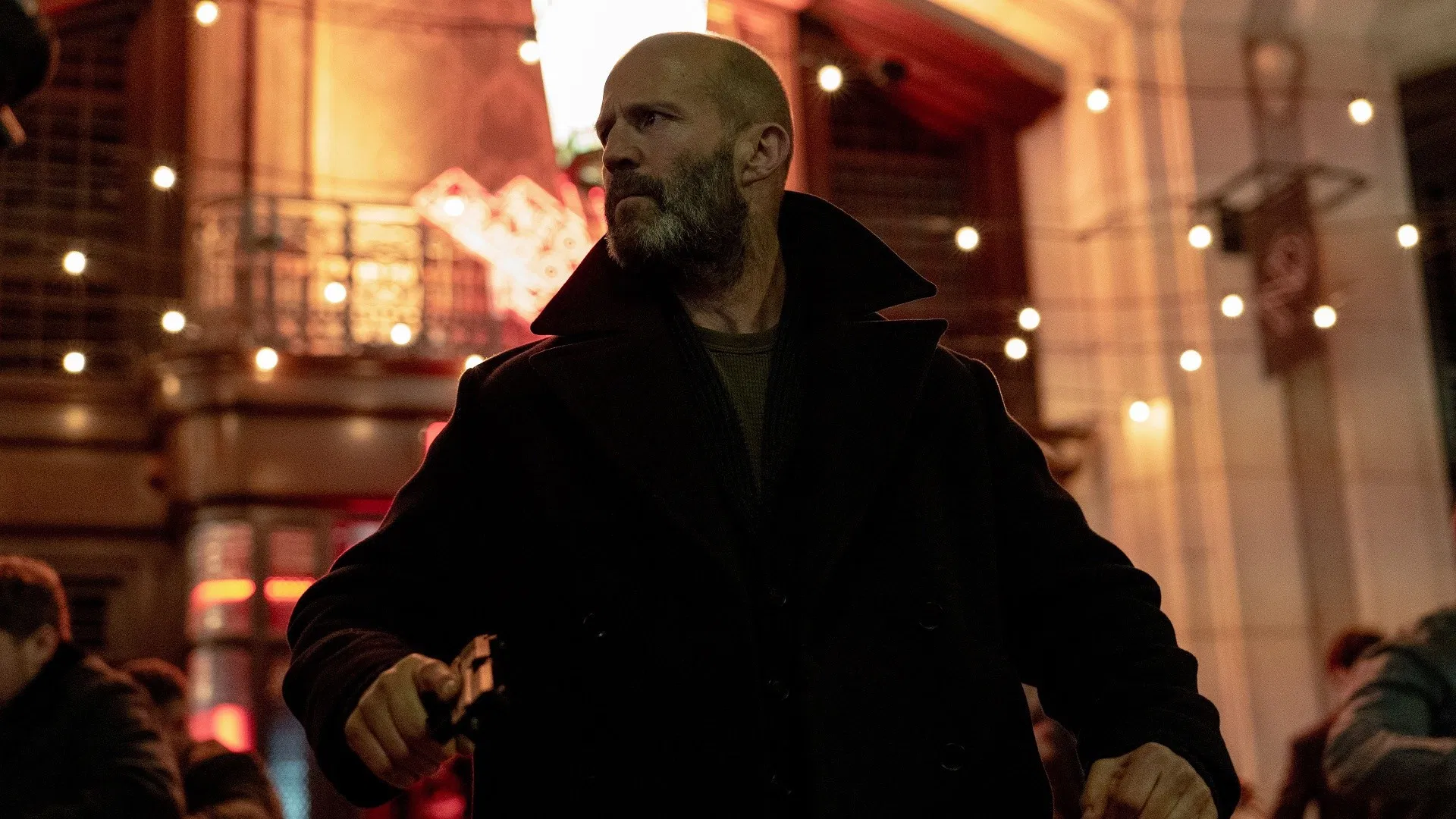‘The Running Man’ REVIEW: Running On Empty
‘The Running Man’ REVIEW: Running On Empty
Glen Powell as Ben Richards in The Running Man / Photo courtesy of Paramount Pictures International
The Running Man makes for a boring show. No, not the fun Korean reality game show. And no, not the movie The Running Man, the new adaptation of the Steven King (written under the Richard Bachman alias) novel and co-written and directed by Edgar Wright, but the TV show The Running Man that exists within the dystopian world of the film.
I’ll lay down the rules of the show: Three contestants, branded as enemies of the state, must survive for 30 days while being pursued by the TV network’s personal hitmen known as the Hunters. There’s a bombastic host, a rabid in-studio audience, and heavily marketed star personalities, just like a real smash-hit game show would have. At the end of the 30 days there’s a billion-dollar cash prize waiting for the survivor, with bonuses along the way with each passing week they stay alive and each Hunter they manage to kill while doing so.
Contestants must also disappear from the public eye to have a fighting chance, going off the grid to avoid having their whereabouts reported by other citizens, who receive cash incentives for these acts of “public good”. It’s a very compelling premise with obvious, morbid appeal. It’s like The Hunger Games on a national scale. Each episode has life and death stakes, literally.
Except that it’s really more like watching an elaborate game of hide and seek. While hiding across the country, contestants are required to mail in 10-minute videotapes every day, short video journals updating the audience on what’s been happening. The Running Man airs on a nightly basis, and it would appear that the bulk of the episodes are made up of these video diaries. The only time the show cuts to a live segment is when the Hunters have already tracked down a contestant and are ready to kill them.
And 99% of the time, that results in the contestant’s elimination. Because the whole point of the show is hiding from the Hunters, these live segments don’t happen every night, so other than that, the audience never sees the contestant run around and hide, nor do they see the Hunters track them down. All they get to see are the Hunters smoking out the contestants from whatever hole they managed to crawl into, which means that a majority of the episodes are 10-minute vlogs. Does this not make for a pretty boring show?
One of the most compelling aspects of a reality show are the cameras constantly following contestants and subjects, observing and recording every choice they make and every interaction they have, to be broadcast and scrutinized worldwide. But on The Running Man, you’re only on camera some of the time, missing out on all the real action. I don’t mean to be pedantic and go after every little detail in this film, but it is hard not to when the success of The Running Man show is supposed to drive much of the story of the film. We’re supposed to believe that the show is so captivating that it pacifies an entire country from revolting against dictatorship. It’s hard to believe it didn’t get cancelled after one season.
Glen Powell as Ben Richards in The Running Man / Photo courtesy of Paramount Pictures International
But I digress. The show not being fully realized is more of a nagging issue than a glaring one. And we’re audiences of the movie, not the show. It’s got Edgar Wright at the helm and Glen Powell in front of the camera, outwitting and outrunning the government and network forces out to get him. Wright is one of the defining filmmakers for my generation. He’s got a strong visual style and a unique sense of humor, and he’s more than proven that he can put together a dynamic action sequence.
Powell is a rising movie star with a winning personality and skills behind the camera to boot, charming his way through last year’s summer hit Twisters and the fantastic 2023 crime-romance-comedy Hit-Man, which he co-wrote with director Richard Linklater. Who could be a better fit for the starring role in a film titled The Running Man than Tom Cruise’s very own protégé? This should be a home run. Pity that it’s not.
I still believe in the Glen Powell movie star project, and I think he’s not to blame here. Powell plays Ben Richards, a hard up, down on his luck father to a 2-year-old daughter and husband to Sheila (Jayme Lawson). He’s a blue-collar worker who’s been blacklisted for reporting workplace hazards to a union; she’s a nightclub waitress who pulls endless shifts so their family can barely scrape by. The Running Man imagines a near future version of the United States, a totalitarian police state controlled by a media empire known only as the Network.
Ben and Sheila live in the slums of Co-Op City, blocked off from the affluent communities, with little to no access to the resources they need to live. Their daughter is dangerously sick, but without a healthcare system that’ll provide the medicine that she needs to live, Ben has no choice but to audition for Network shows to make quick cash. If he wins The Running Man, he’d make life changing amounts of money. He could save his daughter and move his family out of Co-Op City, improving their lives forever. Or goes the fantasy sold to him.
Winning The Running Man is a big if, because nobody’s ever won. Ben is a physical manifestation of anger, raging against the machine, the system that leaves his family helpless, that blacklists him from employment because he kept sticking his neck out for others, that forces him to participate in the future equivalent of gladiatorial death matches in order to keep living. As Ben, Powell explores an avenue that he has yet to go down as a leading man. Whereas his previous roles were slick and charming, in The Running Man he plays pure desperation. He’s a man pushed to the edge, with no reason to flash a megawatt smile. He’s also a credible action star, doing as many in-camera stunts as possible, and really selling the physical intensity of the journey Ben has to go through. Of course, the Tom Cruise training pops out when he’s running, though for a film called The Running Man, there just isn’t enough running in it.
Edgar Wright and Glen Powell behind the scenes on The Running Man / Photo courtesy of Paramount Pictures International
Unfortunately, trying to look for Edgar Wright in here is like looking for a needle in a haystack. It may be premature to suggest that whatever magic he once had has completely fizzled out, but wherever it has gone, it certainly didn’t make its way into this movie. I think it’s at least partially because his strengths are a total mismatch for the material. His best works — The Three Flavors Cornetto Trilogy and Scott Pilgrim Vs. The World (and I’ll throw in his TV series Spaced too) — are light on their feet, with expressive camera movement and editing, and precisely executed visual gags.
Even from his TV days, Wright worked with real visual flair. He had an exciting voice almost right out of the gate. It was Sam Raimi meets the Coens meets Looney Tunes, and comic book nerd culture and a Tarantino jukebox thrown in for good measure too. We’ve seen him retrofit his style onto different genre conventions — from a zombie film in Shaun of the Dead, an action film in Hot Fuzz, and an alien invasion film in The World’s End — so why not do the same for the dystopian survival thriller?
Perhaps a generous read of why his signature style seems to have gone missing-in-action is that he didn’t want to be reduced to a bag of tricks (whip pans, crash zooms, quick-cut montage, to be reductive), and that instead of interpreting the genre through his style, he’s letting the genre dictate his style instead. If that is indeed the case, the result is messy.
Action sequences are shred to bits in the edit, the quick cutting perhaps intending to mirror the manic intensity of the dystopian game show, but it results instead in sequences that lack a punch because they’re hard to follow. His effort feels perfunctory at best, lacking the imagination that made him such an exciting filmmaker. If you put Baby Driver next to The Running Man’s car sequences, there is no chance you’d ever say they were made by the same filmmaker.
Glen Powell as Ben Richards in The Running Man / Photo courtesy of Paramount Pictures International
The film isn’t totally devoid of personality. Wright does have the occasional visual gag, like when Powell, wearing a disguise to lay low in public, stands in front of several electronic displays showing his rotating mugshot, which he inadvertently mirrors while he checks out his surroundings, turning his head at the same time as his digital face does. An action sequence set in a derelict apartment building is probably the best in the film, and has the most visually interesting use of the camera.
While evading the Hunters, Powell dashes into a room and sees himself on TV (which is called FreeVee in this world). He whips around to find a camera drone, the flying metal sphere that the network uses to film The Running Man show, hovering and filming through the window. He bolts off, running down a hallway with only a split second to check his surroundings, the Hunters closing in, the film’s camera assuming the perspective of the camera drone as it swivels around and flies after him, feeling very much like the flying first-person perspective force of evil from The Evil Dead.
Even Powell’s performance feels inspired by Bruce Campbell, as he grapples with the drone, staring it down from close-up, furiously pleading with it to stop tormenting him just as Campbell does in Evil Dead II. It’s a shame about the other action sequences, which feel poorly conceived. Having a car chase shoot-out take place from inside the trunk of a car sounds like a fun idea until you watch it.
There’s a fight later in the film that takes place in a private airplane’s cockpit while the plane is in freefall, and the shifting gravity inside the plane combined with the tight space and the rapid-fire editing makes for a dizzying rather than satisfying fight. If you described the beats of the action in The Running Man, it would sound cool, so it’s a major letdown that Wright doesn’t manage to bring it to life.
Wright can’t seem to settle on a tone either. In the past, he’s been able to thread the dramedy needle, especially in the Cornetto trilogy, but in The Running Man it feels like the weight of the text just exceeds his grasp. This is difficult material to pull off as a major blockbuster. It’s no surprise that the first crack at adapting The Running Man, a 1987 action film starring Arnold Schwarzenegger, strayed far away from the text. Police brutality, crippling and widespread poverty, and a government empire that couldn't care less about the suffering, painting any dissidents as America haters and championing bootlickers as true patriots, doesn’t exactly make for a good time at the movies, especially when you can see a world just like that by watching the news.
Wright’s pop sensibilities clash with entertainment that isn’t escapist, try as it might. Nowhere is this more obvious than when Elton Parrakis (Michael Cera), a rebel sheltering Ben in his home, tells the story of his father, a former police officer turned hot dog vendor, who was brutally murdered by his ex-coworkers for leaving the force after it became corporatized. The story is visualized through an old-school projector slideshow that feels far too quirky for what’s being told, not to mention that the anecdote is brought up because Elton keeps a hot dog cart in the corner of a room, seemingly setting us up for a funny gag because Ben is explicitly told not to ask about it. Cera steals the show during his scenes, but not even he can save the monologue from feeling like the “Wacky Dawg has something serious to say” meme.
Glen Powell as Ben Richards and Colman Domingo as Bobby Thompson in The Running Man / Photo courtesy of Paramount Pictures International
Turning The Running Man into a blockbuster also means having to address the book’s ending. Those familiar with the source material might know that the Schwarzenegger-starring Running Man strayed quite far from the text. Wright and co-screenwriter Michael Bacall are more faithful adapters, retaining most of the book’s characterization of Ben Richards (King describes Ben as being “pre-tubercular”, which Powell certainly is not) and following the major plot beats of the story, including the ending.
I won’t give it away here, but the film does follow the book’s ending — but only for a couple minutes. I don’t think fidelity to the source material should be unconditional, but the fake-out ending packs a much heavier punch than what we end up getting. One of the characterizations of the Network is that they can, and often do, manipulate footage (not dissimilar to the AI videos and Deepfakes that are on the rise now) to force the narrative to follow the messages they want to tell the audience. The most dystopian thing about this movie is that the “real” ending feels far more corporate-mandated than the “fake” one.
In high school, I had to write a paper about a person that I idolized and wanted to model my future career after. I wrote about Edgar Wright. I was that big of a fan, and I still am, which means that for me, The Running Man was a letdown. If you’re not a fan and you’re just looking for a good, serviceable time at the movies, then this isn’t a bad pick. It makes some timely commentary and possesses just the right amount of anger — but not too much — to keep the shareholders happy. It maintains a borderline level of entertainment and never dips below that. It features a very game supporting cast. Powell’s a good star trying something a little different, and he also performs a stunt wearing nothing but the tightest towel ever tied around his waist. If, like me, you’re an Edgar Wright fan, and you come looking for the filmmaker that you know and love, you’ll probably walk away ready to file a missing person’s report.
‘The Running Man’ is now showing in cinemas nationwid






















